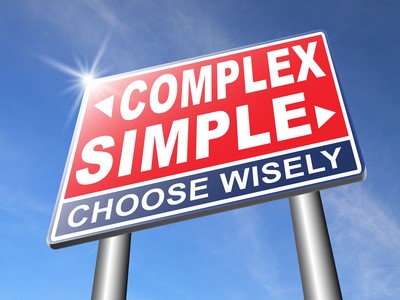“It doesn’t matter how conclusively you prove anything, if the person to whom you prove it can’t accept your proof emotionally, it’s still false. Not-real.”
H. Beam Piper
In praise of simplicity – sing a simple song
Followers of simplicity delight in seeing the world in black and white. You are either for us or against us, a capitalist or a socialist – with little space for shades of  grey.
grey.
Such a binary approach of course appeals at it allows us to label, categorise, align and dismiss according to our lights, our socialisation and our worldview.
Admitting that nearly all opinions can be seen as wrong from another perspective, and that this truism applies to our own views as well as those of others, is rather hard to swallow.
Of course this is why science exists, as a method for pursuing knowledge based upon agreed principles and generally accepted levels of evidence. As Thomas Hobbes said “Science is the knowledge of consequences, and dependence of one fact upon another.”
The trouble with the scientific method, however, is that it can bring inconvenient truths. Perhaps this is why recent years have seen a populist growth in the mistrust of science and expertise in favour of the seemingly robust dependability of ‘good common sense’.
Isaac Asimov recognised this very phenomena years ago when he noted “Anti-intellectualism has been a constant thread winding its way through our political and cultural life, nurtured by the false notion that democracy means that ‘my ignorance is just as good as your knowledge.‘”.
Say it aint so…
This problem is well illustrated by ‘false equivalence’ in news and wider broadcast media – which tends to present two sides to every story. The apparent ‘balance’ arises from argument rather than the reliability of evidence or legitimacy of different standpoints.
These are the results of ideological attachment rather than legitimate logic, the fact that a truth is uncomfortable doesn’t make it wrong. Ideology that prevents us from questioning orthodoxy and developing our understanding of the world isn’t there to make us happy, it is there to hold us back. Thomas Paine rather acerbically summed this up more than 200 years ago when he said “To argue with those who have renounced the use and authority of reason is as futile as to administer medicine to the dead.”
I have seen web conversations where, in response to overwhelming examples of personally stated experience of a phenomena, someone will join the debate saying ‘I can’t believe that X situation is really that bad, it doesn’t seem feasible that so many people would have had that experience’. This is reaction not based upon logic but upon sentiment, upon the fact that it is inconvenient for them to recognise a new truth because it would require them to consider, reflect and perhaps change their own behaviour. It is easier to doubt a newly received ‘truth’ than to accept and assimilate its implications.
Put simply, we like things (broadly speaking) to be the same, we like to feel comfortably familiar with things as they are….that is of course if we innately benefit from the status quo.
Those working to change unexamined inequity face an uphill challenge. The status quo is unequal, as the inertia of privileged position is normally strong and frequently actively defended.
Change goes fast, change goes slow
“In every respect the burthen is hard on those who attack an almost universal opinion. They must be very fortunate as well as unusually capable if they obtain a hearing at all. They have more difficulty in obtaining a trial, than any other litigants have in getting a verdict. If they do extort a hearing, they are subjected to a set of logical requirements totally different from those exacted from other people. In all other cases, burthen of proof is supposed to lie with the affirmative.”
John Stuart Mill
The difficulty of changing entrenched positions poses a huge problem for those seeking change for sustainability. We have to do more than prove that capitalism is flawed, we have to prove it far beyond any levels of proof required to maintain the status quo.
Witness the seismic changes in financial markets over the past two decades. The Big Bang in the UK, and the repeal of the Glass-Steagall Act in the US allowed banks to effectively act on their own behalves with customer’s money and to compete with them for profits in the same pool. Such deregulation also facilitated the rise of hedge funds, whose only goal is riding the volatility of the market, and ushered in innovations such as automated trading, which effectively suborn any human judgement of purpose to the cold logic of algorithms.
These changes have changed the logic and purpose of markets beyond recognition (in addition to nearly bringing the global economy to its knees). Where was the public discussion and acceptance of these changes? There was none.
Decisions are made all the time which change the purpose and direction of systems, why should changes to a more sustainable way of doing things require such debate, such levels of proof and a half-hearted adoption over decades?

Leave a Reply